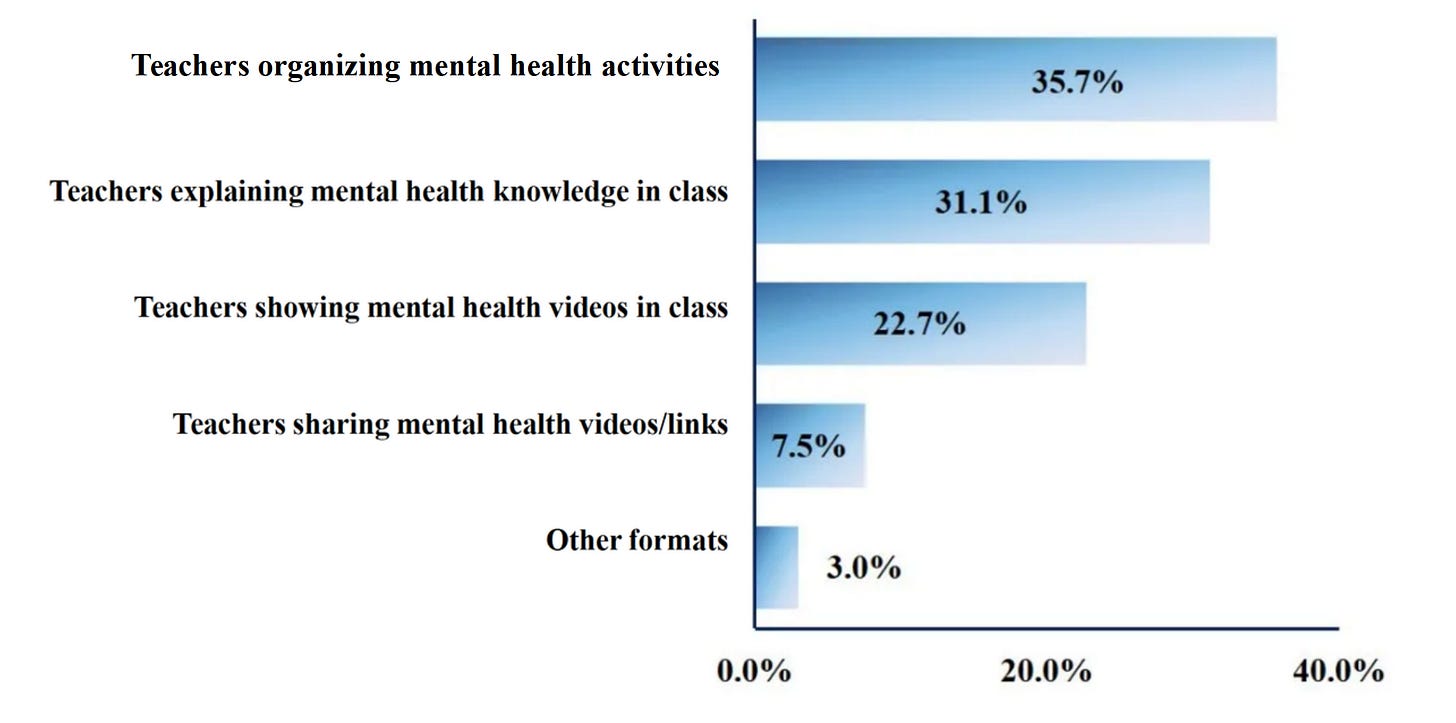Higher depression risks for rural students in China's underdeveloped regions
Official think tank study reveals poor family communication and school deficiencies worsen mental health among rural youth.
Children living in rural areas of China are a social issue that has been spotlighted multiple times by The East is Read, such as the one published last June, which highlights a “very strong correlation” between being a left-behind child and criminality in adulthood.
More recently, on April 17, the Institute of Psychology, Chinese Academy of Sciences, and Social Sciences Academic Press jointly released the Report on the Mental Health of Rural Students in Underdeveloped Regions (2024). Key findings include:
21.5% of sampled students had mild depression risk, and 8.1% were at high risk, exceeding historical averages for Chinese adolescents.
46.1% of students feel unable to be without their phones.
Poor parent-child communication increases depression risk sevenfold, and physical separation between parents and children increases depression risk.
Shortage of dedicated personnel and space in schools for mental health.
Below is the original summary of the survey published on the official WeChat blog of The Institute of Psychology, Chinese Academy of Sciences.
2024年我国欠发达地区农村学生心理健康报告
Report on the Mental Health of Rural Students in Underdeveloped Regions (2024)
The Institute of Psychology, Chinese Academy of Sciences, and Social Sciences Academic Press have jointly released the Report on National Mental Health Development in China (2023–2024), the fourth volume in the Blue Book series. This edition includes the Report on the Mental Health of Rural Students in Underdeveloped Regions (2024), which examines the current psychological conditions of rural students in these areas and the factors influencing their well-being. The report offers data-driven recommendations to improve their mental health.
Adolescence is a critical period for psychological development. Mental health during adolescence plays a decisive role in shaping long-term life outcomes. Compared with their urban peers, rural students in underdeveloped areas face more severe mental health challenges, including a higher risk of depression, greater difficulty adapting to academic demands, increased exposure to trauma, more frequent behavioural problems, and weaker development of positive psychological traits.
Depression risk indicates susceptibility to depressive symptoms and should be distinguished from clinically diagnosed depression or overall prevalence rates.
Large numbers of left-behind children grapple with fragmented family structures and emotional neglect, while rural schools often lack professional mental health resources and well-developed psychological curricula. When compounded by poverty, bullying, and early boarding, these factors constitute systemic risks that demand urgent societal intervention. Research into the mental health of rural students is vital for diagnosing underlying problems and formulating targeted responses.
Against this backdrop, the China Development Research Foundation commissioned the China Mental Health Research Centre under the Institute of Psychology, Chinese Academy of Sciences, and Our Free Sky Beijing to conduct a joint survey on rural students in underdeveloped regions in 2024. The survey gathered 13,992 valid responses from students in grades 5 to 12, with an average age of 14.6 years. Of the respondents, 50.2% were male, 75.7% were Han Chinese, and 65.4% were boarders.
1. Higher Mental Health Risks Among Rural Students in Underdeveloped Regions of China
Depression risks are relatively high and should be prioritised: 70.4% of students showed no risk of depression, 21.5% had mild risk, and 8.1% were at high risk—rates that exceed historical averages for Chinese adolescents.
Smartphone addiction is widespread, particularly among junior high school students (grades 11-13). The report reveals that 46.1% of students feel they cannot bear to be without their phones, while 43.8% report persistent thoughts about their phones even when not using them. The study also highlights notable differences across gender and grade levels, with 12th-grade girls exhibiting the highest levels of dependency.
Academic performance is strongly correlated with mental health. According to self-reported data, 39.3% of the rural students score between 60 and 70 out of 100, while 15.8% consistently fail to meet the passing threshold of 60. Scores in the 60-70 range suggest substantial difficulties in understanding the material and facing academic challenges, while failing scores point to severe academic difficulties. The study confirms a clear inverse relationship: as academic scores decline, the risk of depression increases proportionally.
2. Inadequate Family Support Amplifies Mental Health Risks
Parental Marital Status
The proportion of students at high risk for depression is significantly higher among those with divorced parents (10.0%) compared to those from non-divorced families (7.5%). A clear pattern emerges: students reporting the most harmonious parental relationships exhibit the lowest depression risk, while those experiencing severe marital discord face the highest prevalence.
Parent-Child Communication
Perceived parent-child communication is a crucial foundation for effective parental support. Adolescents who feel their parents do not understand their struggles have depression risk rates seven times higher than those who feel understood by their parents.
Physical Separation
Both parental absence and attending boarding school increase mental health vulnerabilities, with the highest depression risk observed among students who have both parents away for work.
3. Insufficient Mental Health Education Resources and Limited Intervention Efforts in Rural Schools
Shortage of Mental Health Professionals and an Uneven Distribution of Resources
The report indicates that 79.7% of rural schools have mental health counsellors, but most are part-time, with only a few schools employing full-time counsellors. Additionally, 83.1% of schools have counselling rooms, though some share these spaces with other administrative offices.
Mental Health Activities are Preferred
Although 89.8% of schools offer mental health courses, student feedback reveals a strong preference for activity-based programs compared to traditional lecture formats.
4. Policy Recommendations
Comprehensively improve mental health literacy among rural teachers
Increase the number of mental health teachers in rural schools.
Strengthen family support systems and enable families to fulfil their functions.
Leverage new technologies to bring quality resources to rural areas.
Promote activity-based mental health programs.










Glad China’s policymakers are paying close attention to rural communities and their mental health